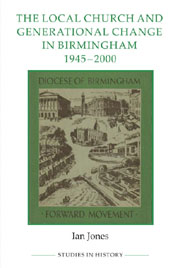Book contents
- Frontmatter
- Contents
- List of figures and tables
- Acknowledgements
- Abbreviations
- Map of Birmingham
- Introduction
- 1 Birmingham: the city and its churches
- 2 The spectre of ‘decline’
- 3 Church, youth and family from the 1940s to the 1960s
- 4 Life and worship in the local congregation
- 5 Church and neighbourhood: four congregational stories
- 6 Towards the margins: being Christian in a pluralist society
- Conclusion
- Appendix: Oral history
- Bibliography
- Index
3 - Church, youth and family from the 1940s to the 1960s
Published online by Cambridge University Press: 05 February 2013
- Frontmatter
- Contents
- List of figures and tables
- Acknowledgements
- Abbreviations
- Map of Birmingham
- Introduction
- 1 Birmingham: the city and its churches
- 2 The spectre of ‘decline’
- 3 Church, youth and family from the 1940s to the 1960s
- 4 Life and worship in the local congregation
- 5 Church and neighbourhood: four congregational stories
- 6 Towards the margins: being Christian in a pluralist society
- Conclusion
- Appendix: Oral history
- Bibliography
- Index
Summary
In 1965 Norman Power, vicar of the inner city parish of St John's, Ladywood, published a hard-hitting reflection, The forgotten people, on a decade of sweeping change in his own local community (where slum clearances had radically altered neighbourhood life) and in the nation at large. Citing Professor G. m. Carstairs's description of the ‘“drab agony” left by the ebbing tide of Christianity in our land’, Power argued that whilst the disintegration of local community life was one salient factor, ‘the main cause is the aggravation, by this disintegration, of the effect of the incredible indifference of many parents to the needs of their children’. Power's Ladywood probably faced more daunting challenges than most, but his views reflected wider Christian concern that the health of Church, community and nation was fundamentally dependent on strong parental commitment to the rising generation. Though hitherto receiving little attention from historians of postwar Christianity, youth and family were key issues of concern for local and national church leaders throughout the period. Where Christians' attitudes to the family have been considered, it has usually been to cast the Churches as bastions of ‘traditional family values’, without any real exploration of their motives or the nuances of their arguments. True, most Christian commentators of the period assumed the importance of a particular conception of family life.
- Type
- Chapter
- Information
- Publisher: Boydell & BrewerPrint publication year: 2012



